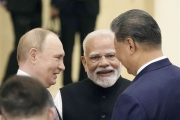
China’s defense budget is poised to witness a 7.2 percent increase this year, surpassing both last year’s and the country’s total projected economic growth. The revelation was made on March 5 at the opening of the National People’s Congress (NPC) in Beijing, according to reports by Reuters.
In figures, China’s defense spending would be equivalent to 1.55 trillion yuan (more than $210 billion). Only the United States, whose Pentagon has $750 billion in its budget, exceeds China’s defense spending considerably.
Analysts cited by pro-Beijing The Global Times revealed that the 7.2-percent increase marks a “reasonable and restrained boost amid military spending sprees by many other countries around the world in light of global security tensions.”
The same report cited Song Zhongping, a Chinese military analyst and TV commentator, telling The Global Times that a 7.2 percent increase in defense budget would imply only a 0.1 percentage point higher than last year’s budget. Song then concluded that such a figure was not high at all in light of China’s national defense needs and economic development.
China’s GDP growth rate in 2022 was 3 percent, thus the defense budget growth is set to be restrained and reasonable, Song said.
Beijing is hoping to achieve the modernization of national defense and the armed forces by 2035 as well as fully propel China’s armed forces to global prowess by the mid-21st century, the Xinhua News Agency reported on August 1, 2022, the 95th anniversary of the founding of the People’s Liberation Army (PLA), the primary military forces of communist China
To realize its target, China has to slowly increase its defense expenditure over many years together with the country’s economic growth, a Beijing-based military specialist also revealed to The Global Times on the condition of anonymity.
National defense modernization would entail developing and obtaining new weapons and equipment, maintaining a high level of realistic combat-oriented exercises of the troops as well as improving the welfare of military personnel, the unnamed specialist said.
Observers posited that this year would see the PLA commission more advanced warplanes including J-20 stealth fighter jets and J-16 multirole fighter jets at a time when legacy J-7 fighter jets are being decommissioned. Moreover the PLA is slated to stage sea trials for the country’s third aircraft carrier, the electromagnetic catapults-equipped Fujian. Furthermore, the PLA is poised to hold more realistic combat-oriented drills that require large amounts of costly live munitions and fuels.
Notably, China’s defense budget is rising faster than the economy; China is aiming to achieve a conservative five percent in economic growth this year — its lowest in decades.
Last year, China recorded an economic growth of only three percent despite its target of 5.5 percent. This figure was one of China’s weakest growth rates in decades, partially owing to authoritarian leader Xi Jinping’s zero-Covid policy that entailed months of draconian lockdowns and widespread unemployment. A crisis within China’s real estate sector, along with a fall in demand for Chinese exports, further exacerbated China’s economic situation.
In his opening address to the People’s Congress, attended by 3,000 delegates from the Chinese Communist Party (CCP) and expected to conclude on March 13, Premier Li Keqiang pointed out the need for economic stability and consumption growth.
He set a goal of 12 million new jobs in cities, exceeding the target of 11 million a year ago. Li added that the country foresaw a budget deficit of three percent of GDP, up slightly from last year’s 2.8 percent.
“Global inflation remains high, global economic and trade growth is losing steam, and external attempts to suppress and contain China are escalating,” he cautioned.
To prepare for emergency situations when “external attempts’ result in violence, China’s armed forces must channel more efforts to training under combat conditions and enhance combat preparedness, he said.
However, Li’s comments on Taiwan were markedly diplomatic, in contrast with more belligerent statements made by other officials. Beijing, he said, should enhance the peaceful development of cross-Strait relations and advance the process of China’s “peaceful reunification.”
Beijing considers Taiwan part of China, a renegade province to be taken back by the mainland, by force if necessary.
Former Shanghai party chief Li Qiang, 63, a longtime Xi ally, is expected to replace Li, 67. He would be charged with rebooting the world’s second-largest economy while it is still reeling from the negative aftermath of Xi’s zero-Covid policy measures.
This year’s Congress is expected to further entrench President Xi Jinping’s power. Apart from Li, other reform-oriented officials are set to retire, setting the stage for Xi loyalists to take over.
During last October’s Communist Party Congress, when he nailed his third term in power, Xi emerged as the most powerful leader in modern Chinese history since CCP founder and brutal dictator Mao Zedong.
The Taiwan issue has been a thorn in ties between China and the United States, and the Biden administration’s weak attempts to convince China to distance itself from Russia regarding the conflict in Ukraine has only served to further strain ties. Suspicions that China has been supplying arms to Russia for the Ukraine conflict only served to fan the flames of hostilities between both countries.
In light of U.S. claims that China might supply Russia with weapons for the conflict in Ukraine, German Chancellor Olaf Scholz maintained that China has reiterated that it will not supply Russia with weapons, indicating that Berlin may have received pledges from Beijing on the matter.
The German chancellor’s remarks about China and Russia came on March 5 during a press conference with European Commission President Ursula von der Leyen at the German government retreat in Meseberg north of Berlin. Although Von der Leyen told reporters that the European Union (EU) has received “no evidence” from Washington that Beijing is thinking of arming Moscow, Scholz claimed that China had assured him it would not supply Russia with lethal military support.
“We all agree that there should be no arms deliveries, and the Chinese government has declared that it will not deliver any either,” Scholz said, adding, “We insist on this and we are monitoring it.”
During an interview aired on CNN, Scholz cautioned that there would be “consequences” for China if it provided Moscow with weapons.
“I think it would have consequences, but we are now in a stage where we are making clear that this should not happen, and I’m relatively optimistic that we will be successful with our request in this case, but we will have to look at [it] and we have to be very, very cautious,” the German chancellor told CNN’s Fareed Zakaria.
Scholz’s comments came after U.S. Secretary of State Antony Blinken expressed deep concern that China may be on the brink of supplying lethal aid to Russia to boost Russian efforts in Ukraine.
“The concern that we have now is, based on information we have, that they’re considering providing lethal support,” Blinken said to the U.S. press last month. “And we’ve made very clear to them that that could cause a serious problem for us and in our relationship,” Blinken said, alluding to his talks with the Chinese.
In February this year, Blinken met his Chinese counterpart Wang Yi at the contentious Munich Security Conference, which excluded the Alternative für Deutschland (AfD) party, Germany’s third-largest based on recent polls, but invited high-ranking CCP officials to deliver speeches at the conference.
The conference’s leader, German diplomat Christoph Heusgen, a member of the globalist European Council on Foreign Relations, said on February 13 in Berlin, “I have decided that we will not invite the AfD,” without offering a reason for the party’s exclusion when asked, Junge Freiheit reported.
“This is a decision by the chairman of the Munich Security Conference,” Heusgen told journalists. In excluding the AfD, Heusgen is deviating from the long-held practice of inviting representatives from all parties in the Bundestag.
Besides, Heusgen, who previously was Angela Merkel’s foreign-policy advisor, also refused to invite government representatives from Russia and Iran, choosing instead to invite members of the opposition in both countries.
Petr Bystron, the foreign-policy spokesman for the AfD parliamentary group, responded to his party’s exclusion by stating that “in times of war, voices of peace are shut out.” Bystron’s official statement read:
By excluding the AfD MPs from the MSC, the organizers are confirming that they are not concerned with dialogue and the exchange of opinions. Here, a stage for further intergovernmental confrontation in an increasingly multipolar world is financed solely with German tax money. In times of war, the voice of peace is shut out. Heusgen’s predecessor Ischinger invited at least some members of the AfD parliamentary group. The fear of uncomfortable opinions must be very great if not even this formality is fulfilled.
Globally recognized as the most crucial gathering of politicians and analysts on security policy, the Munich Security Conference hosted more than 40 heads of state and 90 ministers worldwide, including U.S. Vice President Kamala Harris, French President Emmanuel Macron, German Federal Chancellor Olaf Scholz, Polish President Andrzej Duda, and of course, CCP government officials.




